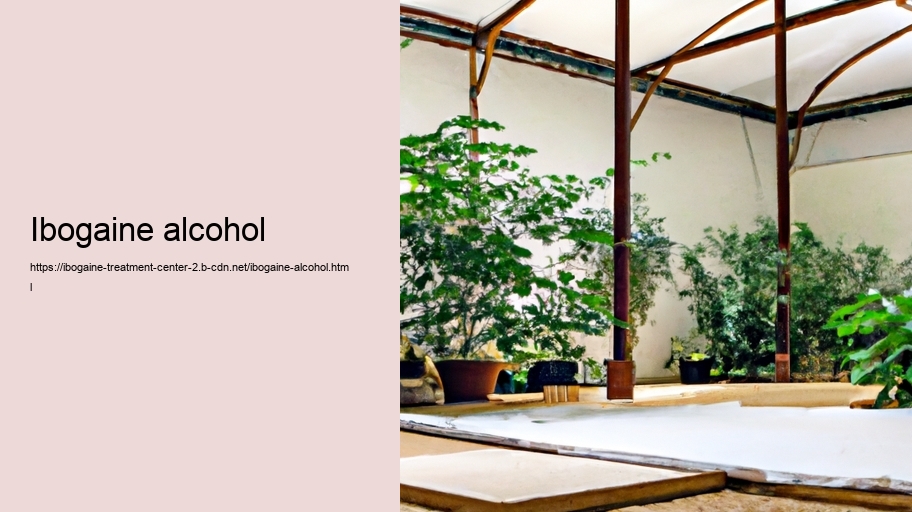Title: Ibogaine: A Glimmer of Hope for Alcohol Addiction
In the realm of addiction treatment, there is a constant search for effective therapies that can provide lasting results with minimal side effects. This quest has led researchers and practitioners alike to explore unconventional methods, one of which is the use of ibogaine as a potential treatment for alcohol dependence. The use of ibogaine in this context is not only innovative but also controversial, making it a subject worthy of in-depth discussion.
Ibogaine is a naturally occurring psychoactive compound derived from the root bark of the African shrub Tabernanthe iboga. Traditionally used by indigenous West African communities in spiritual ceremonies, its properties have been discovered to extend far beyond ritualistic uses. What makes ibogaine particularly interesting is its unique ability to reduce withdrawal symptoms and decrease cravings for various substances, including alcohol.
To understand how ibogaine may help those battling alcoholism, we must first delve into what alcohol addiction entails. Alcohol Use Disorder (AUD) is characterized by an inability to control or stop drinking despite negative personal and social consequences. This disorder affects millions worldwide and can lead to severe health complications such as liver disease, cardiovascular problems, and neurological damage.
Current treatments for AUD include behavioral therapies, medications like naltrexone or disulfiram, and support groups such as Alcoholics Anonymous (AA). However, these conventional approaches do not work for everyone; some individuals continue to relapse or experience significant withdrawal symptoms that make sustained recovery difficult.
This is where ibogaine comes into play. Studies suggest that a single dose of ibogine can significantly disrupt the pattern of addiction through its interaction with neurotransmitter systems involved in substance use disorders. Ibogaine appears to reset certain brain circuits related to dependency by blocking neuroreceptors that are stimulated by substance intake—this includes receptors acted upon by alcohol consumption.
Moreover, many users report profound psychological insights during their experiences with ibogaine—a phenomenon often described as a "waking dream" state—which can offer deep personal introspection leading to behavior modification towards substance use. These subjective accounts align with anecdotal reports indicating that after undergoing an ibogain-aided detoxification process, some individuals find themselves free from the overwhelming cravings typically associated with recovery from addiction.
However promising these findings might be, it's important not to overlook the challenges that come with this potential solution. Ibogain administration poses significant risks including cardiac complications which could be fatal if not monitored closely in a medical setting. Additionally, due to legal restrictions in countries like the United States where it remains categorized as a Schedule I substance under federal law—defined as drugs without currently accepted medical use and high potential for abuse—the access to safe and regulated treatment facilities remains limited.
The lack of large-scale clinical trials further complicates matters since most evidence available today stems from small studies or anecdotal reports rather than rigorous scientific evaluation. Without comprehensive research data supporting its efficacy and safety profile compared against standard treatments for AUDs more broadly accepted within medical circles will remain elusive thereby stalling broader adoption across therapeutic practices worldwide despite individual success stories emerging from underground networks offering such services illegally due circumstances surrounding regulatory hurdles facing legitimate scientific inquiry into this intriguing yet controversial topic still unfolding daily around us all seeking better ways forward amidst complex challenges facing society at large when dealing with issues pertaining directly towards improving public health outcomes especially concerning addictions affecting so many lives globally now more than ever before history humanity itself faces critical crossroads requiring thoughtful consideration moving ahead together collectively aiming towards brighter futures ahead surely possible if only given proper chance succeed ultimately time will tell story fully once unfold completely future awaits patiently watching intently eager see next chapter begins ...
In conclusion while interest continues rise regarding using novel substances like 'iboga' tackling tough problems like 'alcoholism,' caution exercised alongside optimism necessary ensure best chances successful outcomes achieved safely responsibly manner ensuring every step taken informed evidence-based approach maximizes benefits minimizes harms those struggling break free chains addiction seek reclaim their lives newfound sobriety hope springs eternal ever-lasting pursuit happiness peace mind body soul intertwined intricately dance life goes on...
